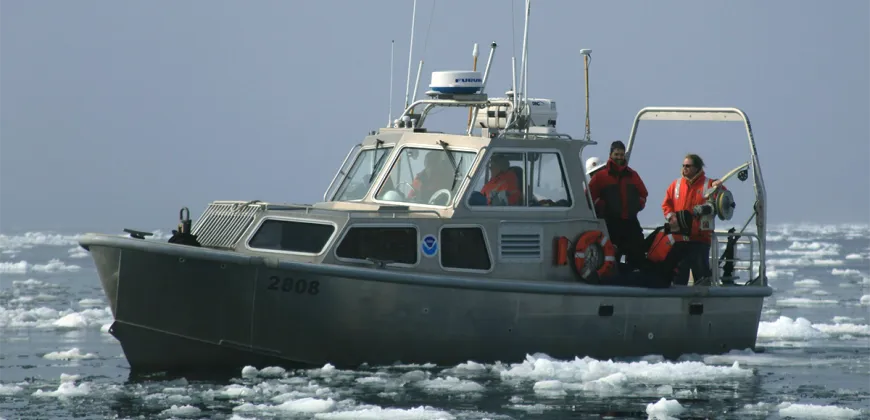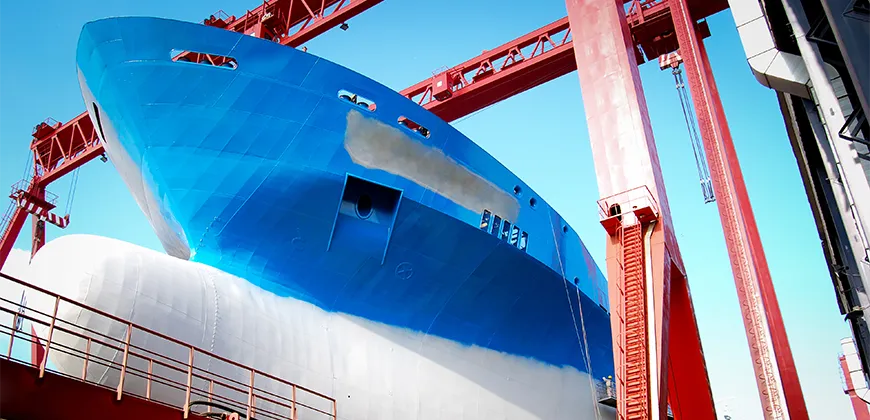Succeeding in today's maritime industry as a marine engineer

Marine engineers are leading the transformation of the maritime industry.
They play critical roles in supporting the sector’s decarbonization commitments, as well as advancing innovations to improve efficiency, integrate new technology and promote solutions that align with social and environmental goals – and doing all this cost-effectively and efficiently. Not surprisingly, there is intense demand worldwide for professionals who have the unique blend of technical proficiency, project management expertise and communication skills needed to lead the industry forward.
Canada’s maritime industry is riding the waves of change
Canada's maritime industry offers a wealth of opportunities for marine engineers.
The National Shipbuilding Strategy, launched in 2010, is a long-term commitment to renewing the country's federal fleet and rebuilding the marine industry, providing economic benefits and job creation across the marine supply chain. Vancouver’s Seaspan Shipyards is currently building joint support ships, an offshore oceanographic science vessel, multi-purpose vessels, a polar icebreaker and offshore fisheries science vessels for the Canadian Coast Guard and Royal Canadian Navy as part of this national strategy.
British Columbia’s maritime sector is the largest in Canada, generating significant economic output and sustaining more than 34,000 jobs.
The province is home to Canada's two largest and fastest-growing ports and there are growing opportunities for marine engineers in shipbuilding, repair and marine technology. Globally, the industry is also growing, driven by ever-increasing levels of international trade. Fortune Magazine predicts that the marine vessel market will grow from US$160 billion in 2024 to US$247 billion in 2032, spurred by growing demand for vessels and advances in shipbuilding technology.
This is a dynamic industry at the forefront of exciting advances in decarbonization and technology development.
The sector is in a period of transition as it seeks to reduce emissions to net zero by 2050 as mandated by the International Maritime Organization and adopted by governments around the world. Achieving this ambitious goal requires innovative new approaches to the design, construction and maintenance of vessels and structures.
Leaders in marine engineering needed to lead transformation
A new kind of professional is needed to guide the transition to a more sustainable maritime industry.
As has always been the case, people with strong technical expertise and industry experience will chart a new path forward. But this alone is not enough.
More than ever, we need marine engineers who are visionary leaders, strong communicators and innovative problem-solvers.
This has opened up exciting opportunities for professionals who combine technical engineering expertise with powerful people skills. These leaders have the communication and team-building skills to bring together different engineering teams to solve complex technical problems and who can work with stakeholders from government, communities and industry to find common ground and sustainable approaches.
A master’s degree in marine engineering
The comprehensive curriculum for UBC’s Master of Engineering Leadership in Naval Architecture and Marine Engineering was designed for professionals with at least three years of industry experience who want to gain the interdisciplinary technical and business skills to support their transition to roles with greater levels of responsibility and oversight. The curriculum covers the entire value chain – from design requirements through to design and build, operations, support and retirement – grounded in hands-on learning experiences, projects and case studies. Strong connections with local industry ensure that the curriculum is relevant and addresses emerging issues and trends. These technical courses are complemented by courses on leadership, data analytics, strategy and sustainability, ensuring that graduates have the business knowledge needed to advance into leadership positions.
Four top skills for today’s marine engineers
Over the course of the 12-month program, students develop the interdisciplinary skill set needed for success, focusing on the following four key skills:
- Technical proficiency: Marine engineers solve complex engineering problems that require expertise in a range of disciplines, from hydraulics and propulsion to structural analysis. They need to be proficient in a range of software tools and data analytics essential to modern design and manufacturing. The technical courses that make up just under half of the MEL curriculum support the development of these skills and ensure students are up to date with the latest advancements in technology.
- Project management: Marine engineers in leadership positions are responsible for integrating interdisciplinary teams and delivering projects within demanding timelines and budgets. Students learn essential project management skills through specific course modules, as well as by completing group project work in each course.
- Communication: Marine engineers need to be confident communicating in writing and in person with a wide range of technical and non-technical audiences. Lively class-based discussions and a focus on presentations and group work empower students to become confident communicators.
- Business knowledge, including finance and accounting: Marine engineering leaders need to be comfortable with the financial aspects of projects, including budgeting, cost estimation and economic analysis to ensure projects are on track and economically viable. Students gain these skills through the Business Acumen course offered over four weeks in the summer term, where they also learn essential skills in human resources, information technology and other relevant topics.
Alumni Sohan Mishra says that the program’s interdisciplinary focus enables graduates like himself to move from being an engineer to being an engineering leader.
“For me, an engineer is someone who gets into the technical side and wants to make the changes that will bring new efficiencies to a project,” he says.
“An engineering leader has that technical knowledge, but is also able to connect that to the business environment and strategy. It’s sort of a techno-commercial approach that I believe can be learned. This program helps you learn how to have confidence in your ideas so you can get the backing of a wide range of stakeholders, from technical managers to company owners and financial institutions.”
Opportunities for marine engineering leaders
Marine engineers with a deep understanding of marine systems and structures – combined with skills in project management, quality assurance and communication – are positioned for success in the maritime sector.
Employers across the industry are in short supply of professionals with the maritime experience and technical and people skills needed to propel the industry forward in new, innovative and sustainable ways. “Our graduates bridge many different areas within the sector – they are as comfortable talking with the folks on the ships and the people involved in building them as they are with those involved on the project management and business development side,” says Program Director Jon Mikkelsen.
“The MEL provides a much-needed breadth of technical and leadership knowledge, pushing people a little beyond their comfort zone and setting them up well for success.”
Professional master’s degrees like UBC’s Master of Engineering Leadership in Naval Architecture and Marine Engineering provide forward-thinking individuals with the skills needed to move into leadership positions in the global maritime industry. This is thanks to:
- An interdisciplinary curriculum that combines technical and business knowledge
- Opportunities to connect with industry leaders through course projects
- Industry networking opportunities throughout the year
- Learning alongside other professionals like yourself, from all over the world, who bring impressive experience to their studies
- The potential to participate in UBC programs like Sustainability Scholars and Creative Destruction Lab
As former Program Director Dr. Chris McKesson says: “[The industry needs] people who have a big-picture understanding of the integrated system, a working technical knowledge of multiple disciplines and the ability to synthesize all of that information and make decisions.
"There are 100,000 ships on the planet and there are only a few places where you can get the integrated training to develop the skill set needed to work in the field.”
UBC is one of those places, and alumni of the MEL in Naval Architecture and Marine Engineering are well prepared to advance in their careers and make a tangible impact in one of the world’s most vital and important industries.






